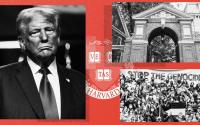30 June 2005Yahoo News
The debate on global warming is likely to see President George W. Bush in an awkward position at next week's G8 summit, with no change in his administration's position on signing the Kyoto protocol.
Washington has even questioned scientific data on the matter.
"In terms of climate change, I've always said it's a serious long-term issue that needs to be dealt with," Bush said in June, during a White House news briefing with British Prime Minister Tony Blair, host of the July 6-8 summit in Scotland.
But the United States "want to know more about" the problem of climate change, he added, putting paid to hopes the US administration might make concessions.
Tony Blair, a close ally of Bush, wants to make global warming one of the dominant themes of the summit, where French President Jacques Chirac, Russian President Vladimir Putin, Canadian Prime Minister Paul Martin, German Chancellor Gerhard Schroder, Italian Prime Minister Silvio Berlusconi and Japanese Prime Minister Junuchiro Koizumi will be in attendance.
With the exception of the United States, all of these countries have ratified the Kyoto Protocol targeting the issue of reducing greenhouse gases said to be responsible for global warming.
After arriving in power in early 2001, Bush denounced the Kyoto treaty, saying that it would destroy jobs in the United States. He was also opposed to its non-application to developing countries such as China and India.
According to the Sierra Club the United States produces 23 percent of the gases responsible for global warming, while it hosts four percent of the world's population -- yet uses twice as much energy as Europe for an equal standard of living.
So, in June 2001 Bush presented an energy bill that is still being debated in the Senate.
The bill seeks to develop alternative power supplies, like hydrogen, use of US-mined coal, and the relaunch of building nuclear plants, frozen in the United States since 1979.
The law also opens the way for gas and oil drilling in the Alaskan Ecological Reserve, to the great dismay of ecologists.
Such ecologists denounce links between the Bush administration, especially those of Vice President Dick Cheney and the oil industry. Cheney was head of oil services group Halliburton before becoming US vice president.
He has always declined to publish the list of experts consulted on the energy bill.
Another controversty with White House environmental advisor, Philip Cooney, also recently threw into relief close ties with it and the oil industry.
Cooney, a former lobbyist for the oil industry, joined the Bush administration as an environmental advisor.
According to US press reports, he went to lengths to minimise in US scientific reports the consequences of climatic warming before he resigned in mid-June -- then rejoined the oil industry, at Exxon-Mobil.
If President Bush finds himself isolated at the G8 summit on the issue of global warming, he does not hesitate to quote certain other member countries' energy policies as examples.
While it may not be so popular among the US Republican administration, France has been highlighted by the US president as an example to follow when it comes to use of nuclear energy.






